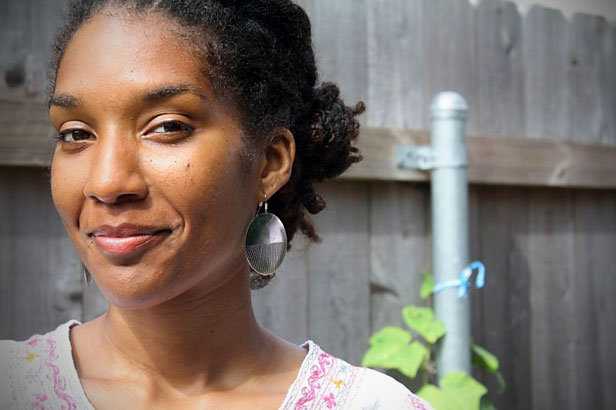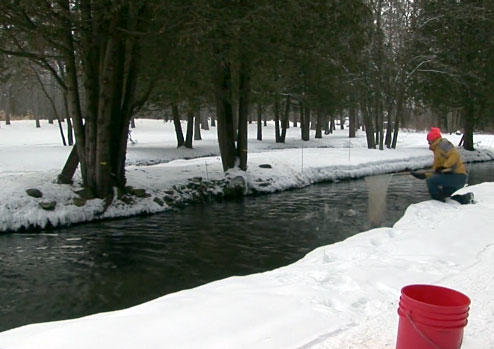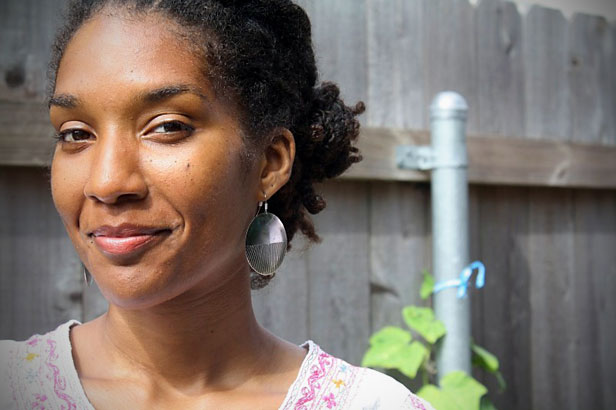In our New Agtivist interviews, we talk to people who are working to change this country’s f’ed-up food system in inspiring ways.

Jenga Mwendo has lived up to her name -- Jenga means "build" in Swahili. (Photo by Lizzy Cooper-Davis.)
In 2007, searching for a way to rebuild her hurricane-devastated neighborhood in New Orleans, Jenga Mwendo reached for seeds and a shovel and became an urban-agriculture community organizer.
The Lower Ninth Ward was the hardest hit by Hurricane Katrina, with floodwaters surging over the nearby Industrial Canal. Mwendo calls the Lower Ninth a “community of survivors.” Only an estimated 25 percent of residents have returned. As a result, a sort of stand-off has occurred: businesses won’t come until the population increases, but the population won’t increase without even basic amenities. There is currently only one school and not a single produce-stocked grocery store there.
Mwendo, 32, was living in New York City and working in computer animation when Katrina struck in 2005. She moved back to rebuild her house, and then started on the neighborhood. In the past few years, she’s revitalized and built two community gardens, launched the Backyard Gardeners Network, and facilitated the planting of 175 fruit trees for homeowners throughout the Holy Cross historic district in the Lower Ninth. She’s also launched a vegan catering business. I spoke with her recently about her work organizing around community gardening.
Q. Why’d you decided to move back to New Orleans?
A. When Katrina hit, my entire family was dispersed around the country and had lost most of their belongings. The only person who lost her life was my grandmother. And that really hit me hard. I sort of became a network — I kept everybody in touch with everybody else. I did fundraising for my family, collected clothing and supplies. It was just a really chaotic and trying time.
A situation like that could bring anybody to a point where they decide to take a risk. I’d been saying for a while that I wanted to live in a way that is fulfilling to me and that is an example to my daughter. In that way Katrina presented me with an opportunity. So I quit my job and I sold everything and I moved out to New Orleans.
My concrete goal when I moved down was to fix up my house — I had actually bought a house [in the Lower Ninth Ward], which was intended to be investment property in July 2005 [a few months before the storm hit]. I had always wanted to work with my hands. So I decided I was going to fix up my house, and I spent about a year and a half doing that. And during that time, I was looking for ways to be a contribution to my community.
Q. How did you get involved in community gardens?
A. It was really by happenstance. One thing about me, is that I think I can do anything [laughs]. Which is a good thing and a bad thing. So I decided that I was going to single-handedly revitalize my block, and I wanted to start a community garden. But when I called Parkway Partners, which is a local nonprofit that helps people start community gardens, one of the first questions they asked me was, Well, who will be the gardeners? They said they wouldn’t help unless I had a team, because it doesn’t make sense to put a garden somewhere if there’s nobody to take care of it.
So they directed me to a garden that was already in existence, and I said OK, let’s work on revitalizing that. It was a little further from my house, but it was still in the community, so I decided that that would be my focus. And I started organizing folks in the neighborhood. We had an initial meeting where about 15 neighbors came out and we cut down the weeds, which were above my head. We cleared that out and started planting and over the course of a few weeks we formed a garden committee, and met on a regular basis, and just started planning what we wanted for the garden and for our community. That just led to other projects that I started doing around urban agriculture in the Lower Ninth Ward.
Q. What kind of an impact have the community gardens had?
A. Community is my focus; the gardens are a means to build community.
We’ve been planting food from the beginning, but these gardens are too small for the focus to be on food access. I think it’s a good example to show what can be grown. And I think it’s been helpful on a small scale for the community — people come by to cut herbs for their food, or whatever we might be growing, like collards or broccoli right now. It’s definitely not enough to feed the entire community. But the focus is on community building, bringing the community together. Giving people the opportunity to grow together if that’s what they want.
I don’t believe in creating gardens just because, or that gardens take precedent over the needs and will of the people. The gardens should be in service to the community, and should be fully utilized and controlled by the community.
Q. Tell me about the Backyard Gardeners Network.
A. It’s a database of [around 100] people who garden or are interested in gardening [in the Lower Ninth Ward]. The idea was to find ways to link experienced gardeners with inexperienced gardeners and to link gardeners with resources around the city.
Currently, the Backyard Gardener’s Network manages two community gardens. In 2011, I’ll be organizing community organizations and individuals to join the BGN and fully participate in creating multi-use community garden spaces. That will include churches holding functions at the gardens;, youth groups maintaining, growing and harvesting; artists presenting their work, residents hosting birthday parties and other events, gardening workshops taking place at the gardens, and community groups hosting meetings, lunches, conferences, and tours.
Q. What kind of role do you see agriculture playing in the Lower Ninth Ward?
A. What surprised me when I came back was that the more people that I spoke to, especially the elders, the more I realized that [agriculture] was really an integral part of the history of the Lower Ninth Ward. At one point, almost everybody had backyard gardens. People still do. There were fruit trees everywhere. A lot of trees were taken down during Katrina.
Agriculture is going to be a binder, a tool for bringing people together. I see the gardens as opportunities to come together, work together, and do things that are going to be beneficial for our neighborhood. Because so much of our energy and resources go out of the neighborhood, we need to find ways to build social capital, and keep money in the neighborhood, that are made by and for people in the neighborhood. To sort of fortify ourselves as individuals and as a community.
Q. Have you always been interested in food?
A. I have always loved to eat. [laughs]
Q. You’re a raw-food caterer. How did that happen?
A. I’ve also always been interested in health — I grew up vegetarian. Somehow I gravitated and got interested in eating raw. I just can’t describe how ene
rgetic I felt: my sinus problems disappeared, my skin was clear and beautiful, and I felt really calm and positive all the time. I’m not 100 percent raw now, but I do eat mostly raw.
This year I tried to do it as a business, because urban agriculture and community organizing doesn’t pay. [Laughs.] It’s something that I strongly believe in. I like to introduce people to the concept of eating food in the most natural state.
Q. Company drops by unexpectedly around dinnertime. What do you do?
A. Invite them in!
Q. What would you feed them?
A. Well, last night I made spicy basil soy “chicken.” And I made a kale-seaweed salad, that’s really good and a big hit with all my clients. And I made a marinated vegetable wrap with mushrooms, tomatoes, bell pepper, onions, garlic, tarragon, and rosemary wrapped in a kale leaf.
Q. What’s your earliest food memory?
A. I remember sitting on the steps of my house [in the Lower Ninth Ward], I was under five years old, and I was eating a ‘frozen cup’ with my brother. My parents never gave us any candy or sugar. They made this mix of orange juice and grape juice, and would make ‘frozen cups’ by pouring that into cups and putting it into the freezer.
Q. Who do you look to for inspiration?
A. My mother. She has been an ongoing example for me of community service and working toward making the world a better place.
Q. What books do you have on your bedside table?
A. Right now I’m reading a book called Radical Homemakers, which is about taking your life back and making your home life, relationships, and communities the focus — as opposed to making money and putting all of your resources outside your home and outside your community. In other words, bringing it back to what’s really important and what makes life worth living for you.



